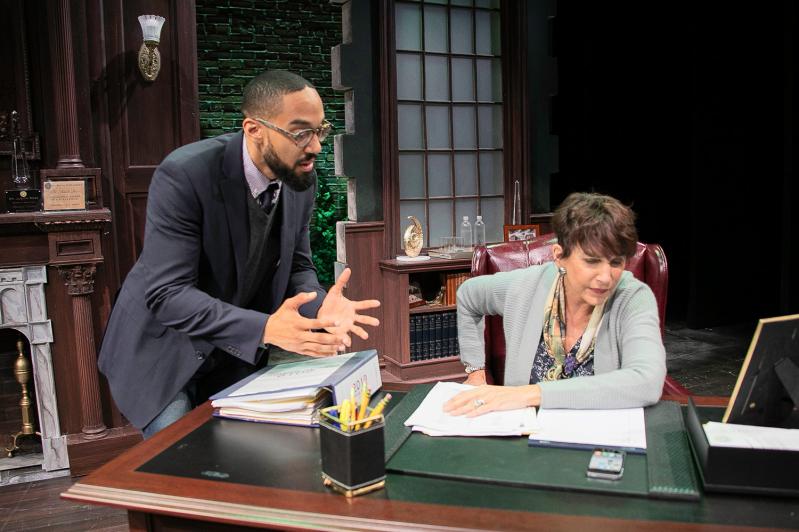A terrific new play, “Safe Space,” is getting its world premiere at Bay Street Theater in Sag Harbor. Undoubtedly bound for larger theaters, it’s about as can’t-miss as local theater gets.
This three-person drama is set at a fictional college named Alman, presumably a milquetoast liberal arts college set in a leafy suburb. As it begins, Marcus, a black history professor (brilliantly played by Rodney Richardson), assigns his students the following exercise: Write an essay that tries to defend the founding fathers’ owning of black slaves. He views it as a harmless, healthy intellectual exercise — trying to understand and inhabit another, if repugnant, point of view. One of his students, however, named Jenny, thinks otherwise.
When we first meet Jenny (in a quietly savage performance by Sasha Diamond), she is on the phone complaining to her parents that she doesn’t want to continue to study medicine (it is their dream that she become a doctor). It is an argument she loses, and this powerlessness manifests itself in her attack on Marcus. His essay assignment, she argues, has made her feel threatened and “unsafe.” Ultimately, she demands that Marcus be removed from the university.
It is left to Judith, the university’s president (an uneven Mercedes Ruehl), to sort this all out. Judith, whose family survived the Holocaust, is sympathetic to Marcus’s outrage, but she is not a survivor for nothing. She concludes that there is no alternative but to bow to Jenny’s demands, and asks Marcus for his resignation.
It’s hard to think of a more timely, hot-button issue than political correctness, and the playwright Alan Fox knocks it out of the park in a brisk, searing hour and 20 minutes, the drama moving from one electric scene to the next. Marcus confronts Jenny, asking what right she has to be outraged at the assignment, when she has hit, culturally speaking, what he calls the “f@#!&$ing lottery!” Jenny argues that she is half Japanese and her people were held in internment camps. Does she think he is a racist? Marcus asks ironically. No, she says, but he is a man, after all, and prone to abusing power. The satire builds as the characters try to top one another with their victimhood, until sanctimony and self-righteousness take on an Orwellian creepiness.
Ms. Ruehl is perfectly cast as Judith, the first female president of Alman College, and she deftly balances empathy with a spirit of self-preservation: Marcus may be right, but she will not take the fall for his sake. Still, during the performance I saw, Ms. Reuhl didn’t seem completely fluid with Mr. Fox’s dialogue, and there was an awkward beat or two as she struggled to keep pace with her lines.
It may be that Mr. Fox is still tweaking his new play night by night, though that didn’t stop Rodney Richardson’s Marcus, and Sasha Diamond’s Jenny from breezing through their parts with full control and confidence — Mr. Richardson harnessing great empathy for his professor, Ms. Diamond embodying Jenny’s self-righteousness with a chilling detachment.
While Mr. Fox gives Jenny some punchy lines to defend herself with (especially when she accuses Judith of promising during orientation that Alman would be a “home,” a meaningless homily meant to sell tuitions), the viewer should make no mistake: “Safe Space” is a satire of the contemporary student, now “clients” of the university more than pupils (with all the power that entails), and more conversant in the jargon of victimhood than on the very subjects they have been sent to study. The satire turns to outright comedy towards the end, when in a recorded voiceover we hear Jenny on the phone with her parents, sheepishly imploring them to send the latest tuition check.
David Rockwell’s sets are spare, but effective; with writing and acting this good, there is no need for distraction. As directed by Jack O’Brien, this is a drama for which the audience claps spontaneously — even mightily — in between scenes, so excited and moved by what they have just witnessed.
For lovers of David Mamet — of good drama of any kind, for that matter — “Safe Space” is a must.
The Wicked Witch
In 2007, Richard Corliss, Time magazine’s film critic, cited Margaret Hamilton’s Wicked Witch of the West as one of the 25 greatest villains in film history. “In the supposedly gentle movie-’30s, the Wicked Witch was an out-of-the-closet sadist, ever threatening to set the Scarecrow on fire and plant a swarm of bees in the Tin Woodman’s hollow chest,” he wrote.
In fact, Hamilton became a kindergarten teacher after attending college and, in addition to her later success as a character actor, served on the Beverly Hills Board of Education from 1948 to 1951 and was a Sunday school teacher during the 1950s.
“My Witch: The Stories of Margaret Hamilton,” a new play by John Ahlin, will have its world premiere at Bay Street with a five-day run beginning Wednesday. Starring Jean Tafler, a New York actor, director, and producer with extensive stage experience, the play details how a gentle teacher from Cleveland terrified generations of children and reveals the intelligence, heart, and courage it took to be a character actor whose image was more New England spinster than Hollywood starlet.
Performances will take place Wednesday and July 21 at 2 p.m., next Thursday at 8 p.m., and Friday, July 19, and July 20 at 5 p.m. Tickets range from $40 to $135.
“Love Notes” From Linda Lavin
Linda Lavin, a Broadway, television, and film star with Tony and Golden Globe Awards to her credit, will perform favorites from the Great American Songbook, jazz standards, show tunes, and Brazilian music on Monday at 8 p.m. at Bay Street. She will be accompanied by Billy Stritch at the piano, Steve Bakunas, her husband, on the drums, and Aaron Weinstein on violin. Tickets are $69 to $89.

